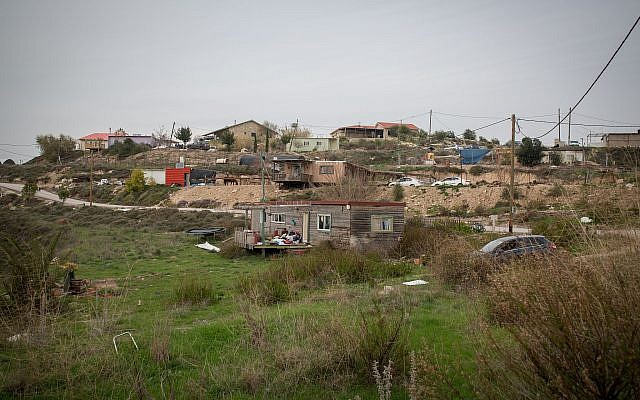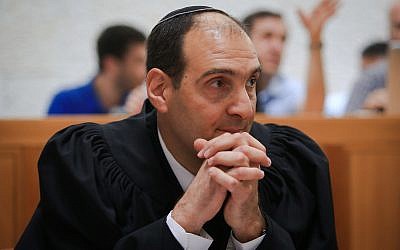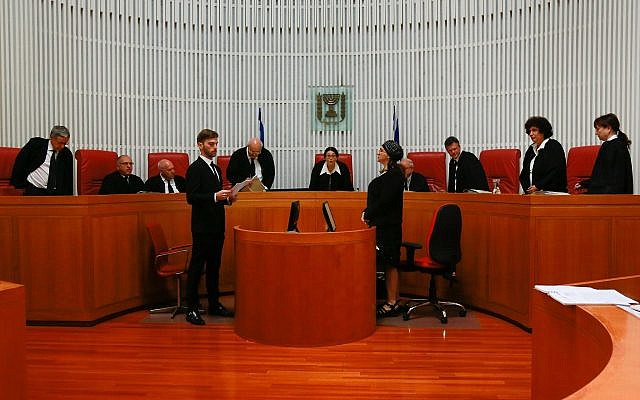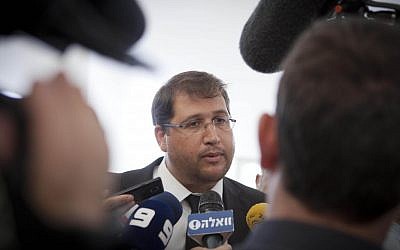Attorney defending Regulation Law in High Court says basic law’s encouraging of ‘Jewish settlement’ allows for preferential treatment to wildcat Israeli towns over Palestinian ones

A state’s attorney said he plans to utilize the recently passed Jewish nation-state law to defend controversial legislation that seeks to legalize wildcat West Bank outposts.
The move would appear to represent the first actual implementation of the contentious nation-state law, which has been derided by critics as discriminatory toward Israel’s non-Jewish minorities.
Some of the law’s backers had contended that it would not change anything but simply enshrine in law Israel’s national symbols and Jewish character. But state attorney Harel Arnon told the Walla news site that the clause promoting Jewish settlement would be used to back the so-called Regulation Law, which allows the state to legalize outposts built on private Palestinian land ex-post facto.
“The nation-state law certainly impacts the Regulation Law. There is no question,” Arnon said Wednesday.
“If until now, the argument in defense of the Regulation Law was that it seeks to balance the individual rights of Israeli residents (in the West Bank) with those of the Arab residents… what the nation-state law does is raise the status of Jewish settlement to one of constitutional value,” he explained.
Article seven of the nation-state law, passed last month, says that “the state views the development of Jewish settlement as a national value and will act to encourage and promote its establishment and consolidation.”

Arnon is representing the state in place of Attorney General Avichai Mandelblit on the Regulation law. Mandelblit announced even before the law was passed in March 2017 that he would not defend the measure, claiming that it ignores the rights of Palestinians.
The legislation allows the Israeli government to expropriate private Palestinian land where illegal outpost homes have been built, provided that the hilltop communities were established “in good faith” or had government support, and that the Palestinian owners receive 125 percent financial compensation for the land.
Analysts say the law will pave the way for the government to recognize some 4,000 illegally built Israeli homes.
The local council heads of 23 Palestinian villages along with 13 rights groups led by Yesh Din, Peace Now and the Association for Civil Rights in Israel submitted two High Court petitions against the law shortly after it was passed.
The petitioners argue that the legislation does not offer those Palestinians uninterested in compensation the legal means to oppose the expropriation.

Moreover, opponents point out that while the Knesset has the authority to pass laws that relate to the Israeli population, the same is not the case for property in the West Bank which is under the authority of the military.
However, the state has argued that Israeli residents of the West Bank are also considered to be the “local population,” whose rights deserve protecting as well, even at the expense of the Palestinian population.
The nation-state legislation was passed last month as a Basic Law, a set of laws that make up Israel’s de facto constitution, against which courts are supposed to judge the legality of other legislation.
The Regulation Law has yet to be employed to legalize wildcat settlement homes, as the High Court has frozen the legislation pending a ruling on the two petitions filed against it.
In June, the first hearing was held on the petitions during which Arnon acknowledged that the Regulation Law is not perfect but asserted that there are no viable alternatives that accomplish the state’s stated goal of legalizing West Bank outposts.
In his Wednesday Walla interview, Arnon acknowledged that the rights of Palestinian property owners need to be taken into account. However, he pointed out that the nation-state law gives Jewish settlement a “higher normative hierarchy.”
Human rights attorney Michael Sfard rejected Arnon’s argument off-hand, pointing out that as opposed to the Regulation Law, the nation-state law has nothing to do with individual rights.
“The Justice Ministry’s legal defense of the legislation was that it would not impact the private rights of Israel’s minorities,” Sfard told The Times of Israel.
The attorney also asserted that the nation-state law makes no mention of its application in the West Bank and that therefore, Arnon’s use of the legislation would appear moot.
His line of defense also “proves that the nation-state law is racist,” Sfard argued, claiming that it is already being used to defend legislation legally differentiating between the rights of Arabs and Jews.

Representatives from the Justice Ministry and the Attorney General’s Office declined The Times of Israel’s request for comment on Arnon’s remarks.
The nation-state law enshrines Israel as “the national home of the Jewish people” for the first time, and says “the right to exercise national self-determination in the State of Israel is unique to the Jewish people.”
The law also downgrades the Arabic language from official to “special” standing, but cryptically stipulates that “this clause does not harm the status given to the Arabic language before this law came into effect.”
Israel’s 1948 Declaration of Independence defined the state as a Jewish and democratic one. The Netanyahu government says the new law merely enshrines the country’s existing character, and that Israel’s democratic nature and provisions for equality are anchored in existing legislation.
But critics, both at home and abroad, say it undermines the declaration’s commitment to equality for all its citizens. It has prompted particular outrage from Israel’s Druze community, whose members say the law’s provisions render them second-class citizens.
As reported by The Times of Israel
